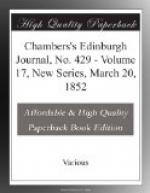——’Auld Coila’s plains and fells,
Her muirs, red-brown wi’
heather-bells,
Her banks and braes, her dens
and dells,’
live again in the magic of his song. And Horace—with what charming playfulness, with what exquisite grace, has he not figured the olive-groves of Tibur, the pendent vines ruddy with the luscious grape, the silver streams, the sparkling fountains and purple skies of fruitful Campania! Looking on nature with a poet’s eye, as did these poets, one and all of them, is it not a psychological mystery that none of them should have detected the ineffable beauty of a sea-prospect?
First, as to Horace. When climbing the heights of Mount Vultur, that Lucanian hill where once, when overcome by fatigue, the youthful poet lay sleeping, and doves covered his childish and wearied limbs with leaves—Horace must have often viewed, with their wide expanse glittering in the sun, the waters of the Adriatic—often must he have hailed the grateful freshness of the sea-breeze and the invigorating perfumes of
——’the early sea-smell blown
Through vineyards from some
inland bay.’
Yet about this sea, which should have kindled his imagination and inspired his genius, this thankless bard poetises in a vein such as a London citizen, some half-century back, might have indulged in after a long, tedious, ‘squally’ voyage in an overladen Margate hoy.
No such spirit possessed him as that which dictated poor Campbell’s noble apostrophe to the glorious ‘world of waters:’
——’Earth has not a plain
So boundless or so beautiful
as thine;
The eagle’s vision cannot
take it in;
The lightning’s glance,
too weak to sweep its space,
Sinks half-way o’er
it, like a wearied bird:
It is the mirror of the stars,
where all
Their hosts within the concave
firmament,
Gay marching to the music
of the spheres,
Can see themselves at once.’
Horace, indeed, has sung the praises of Tarentum—that beautiful maritime city of the Calabrian Gulf, whose attractions were such as to make the delights of Tarentum a common proverbial expression. But what were these delights as celebrated by our poet?—the perfection of its honey, the excellence of its olives, the abundance of its grapes, its lengthened spring and temperate winter. For these, its merits, did Horace prefer, as he tells us, Tarentum to every other spot on the wide earth—his beloved Tibur only and ever excepted. In truth, Horace valued and visited the sea-side only in winter, and then simply because its climate was milder than that to be met with inland, and therefore more agreeable to the dilapidated constitution of a sensitive valetudinarian. His commentators suppose he produced nothing during his marine hybernations: if the inclement season froze ’the genial current of his soul,’ the aspect of the sea did not thaw it.




